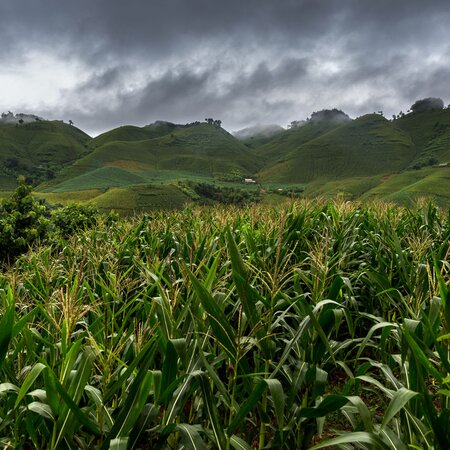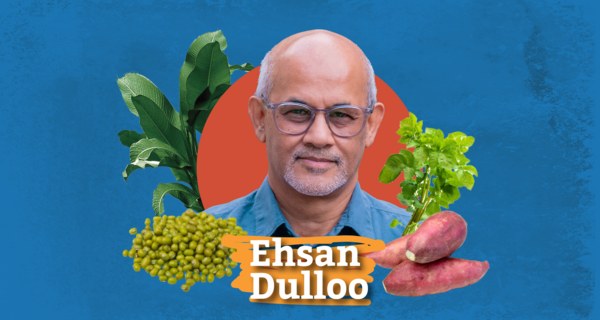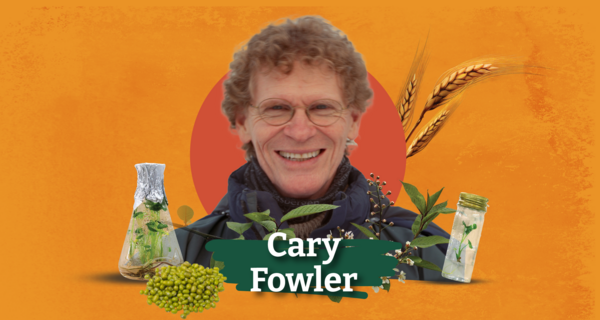Susan McCouch: Pioneer of Modern Rice Breeding
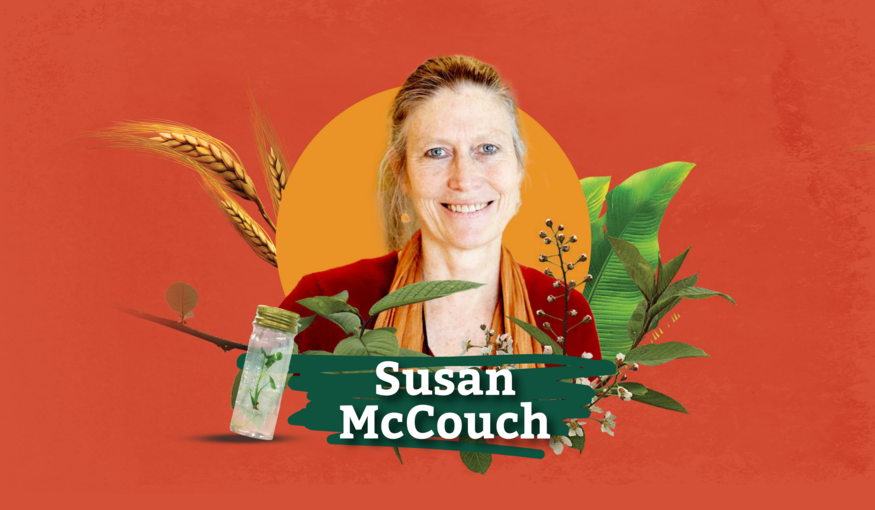
13 December 2024
This edition of our Seed Heroes series is about U.S. scientist Dr. Susan McCouch, who developed the first-ever molecular map of rice and accelerated breeding of improved varieties worldwide through innovative technology.
Over a career spanning almost four decades, Susan McCouch has established herself as a true pioneer of modern rice breeding.
Her research and data tools paved the way for rapid identification of key plant traits as part of the development of new rice varieties. Rice is important—it provides half of the global population with 80 percent of their food.
Dr. McCouch is best known for leading the effort to create the first molecular map of the rice genome in 1988. This ground-breaking research later enabled major crop improvement centers in Asia, Africa and Latin America to accelerate rice breeding efforts.
Through her leadership, genomic technologies and information were widely shared, and rice became a model for genetic research and breeding. She collaborated with genebanks to identify genetic traits in rice’s wild relatives that could be used to improve disease resistance, abiotic stress tolerance, maturity, grain yield and grain quality in domesticated varieties. This is helping to address the threats of climate change and biodiversity loss.
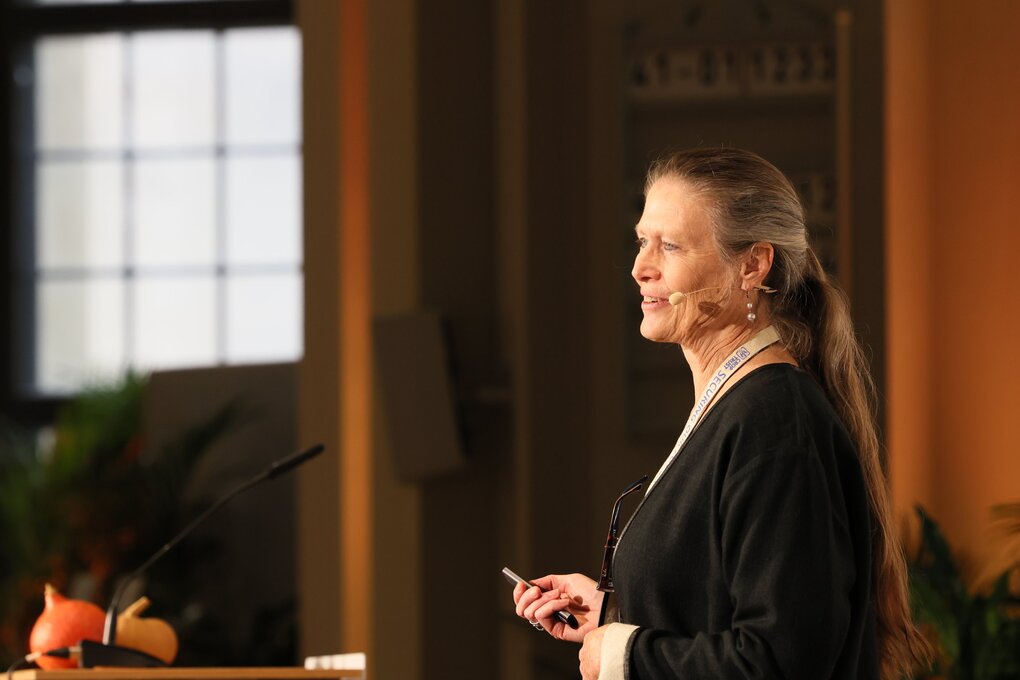
Susan Mc Couch at the Crop Diversity Summit in Berlin, 2023. Credit: MIKA-fotografie
“The diversified agrifood system — as we envision it and aspire to — provides resilience against climate change, nutritional deficiencies, and livelihood challenges,” McCouch said at the Global Crop Diversity Summit in 2023.
As a professor of plant breeding and genetics at Cornell University, McCouch trained scores of young researchers and worked closely with crop breeders to develop improved rice varieties around the world.
In 2018, along with the U.S. Department of Agriculture, her team at Cornell released a nutritious red rice cultivar named Scarlett, known for its nutty, rich flavor, high levels of antioxidants and flavonoids, and naturally produced vitamin E.
In recent years, McCouch has been recognized among the world’s most influential scientists, according to the data intelligence service Clarivate. The annual ranking recognizes scientists who are in the top one percent of their peers based on citations in the scientific literature.
Early Years
McCouch was born in 1953 and grew up in Concord, Massachusetts. She graduated with a Bachelor of Arts degree in Hispanic studies from Smith College in 1975, then lived and traveled in Latin America.
“I decided during that time that my background in literature and history wasn’t really going to give me the tools that I needed to find meaningful work in the developing world,” she said in a 2012 interview. “So, I returned to the United States with a mixture of interests in agriculture, nutrition, food supply and health.”
The road to becoming a pioneering plant scientist was not easy. McCouch first earned a Master of Science degree in plant pathology at the University of Massachusetts in 1982 before turning her attention to studying plant breeding.
In 1985, she applied to graduate school in plant breeding at Cornell after giving birth to her first child. According to McCouch, several professors were doubtful that a woman with a young child could work in this field after her studies, so she was placed on probation, unlike men on the course who were also raising small children.
Rice Mapping
Working diligently to prove herself, McCouch spotted her opportunity in the Rockefeller Foundation’s new program on rice biotechnology. This focused her doctoral studies and sparked ambition to join the team led by Steve Tanksley and Ronnie Coffman, who were proposing to develop a genomic map for rice.
“I was told I didn’t have the qualifications to take on that project in the beginning, but I slowly worked my way into it and was eventually selected for a fellowship,” she said.
With this support, McCouch became a fully fledged graduate student in 1986 and led a team that produced the first map of the rice genome two years later. This connected her with the International Rice Research Institute (IRRI) in the Philippines, where she traveled to present the results of her research.
Move to IRRI
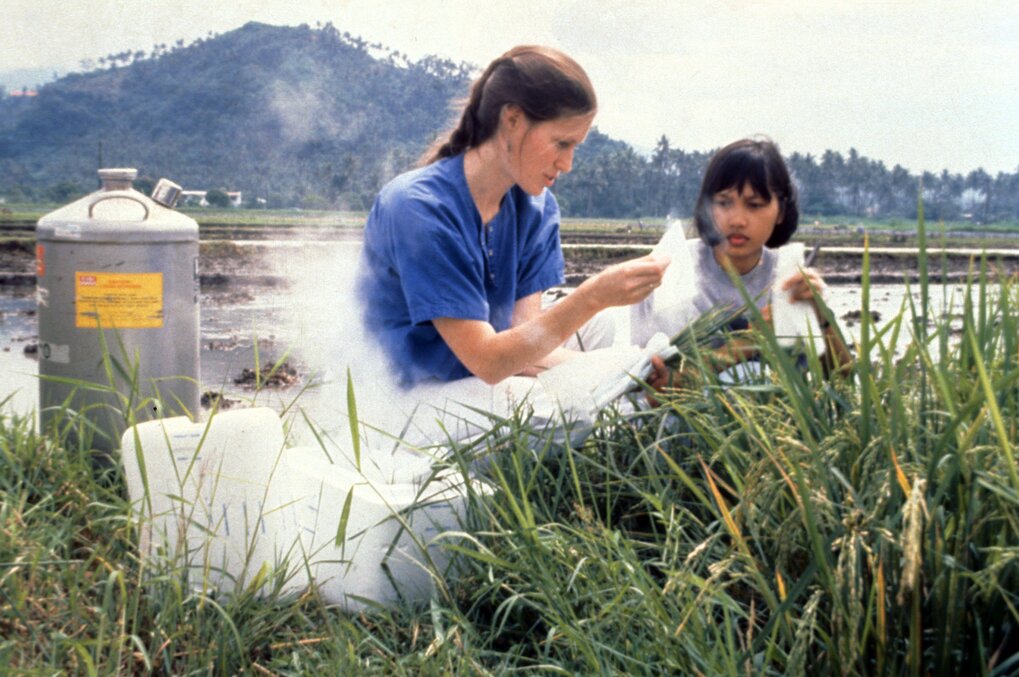
Susan McCouch and staff collect samples at IRRI field for genome mapping. Credit: International Rice Research Institute.
In 1990, after receiving her doctorate at Cornell and giving birth to her second child, McCouch moved with her family to the Philippines to set up a genome mapping lab at IRRI.
Encountering resistance to the new mapping technology, McCouch overcame political obstacles and gained acceptance for marker-assisted breeding through a participatory approach. She pursued this approach for decades to come.
“I did my best to introduce the technology in ways that would bring others the excitement that I felt, and to create excitement of the discovery that was possible using these markers to identify the genes that themselves controlled the traits that breeders selected,” she said.
McCouch remained on staff at IRRI as an associate geneticist until 1994. With her spouse – a qualified veterinarian – struggling to pursue his career in the Philippines, they decided to relocate the family back to the U.S. while she shuttled back and forth to IRRI.
Cornell to Today
In 1995, McCouch joined the faculty of the College of Agriculture and Life Sciences (CALS) at Cornell University, where she has contributed extensively to educational initiatives and international outreach. She has been recognized by numerous teaching, research and faculty awards.
Two years after joining Cornell, she and Tanksley co-wrote a paper highlighting the value of genetic linkage maps for improving yield and other complex traits important to agriculture. This study of how to get the most out of seed banks through molecular maps has been cited more than any other of her works.
After more than 25 years at Cornell, McCouch joined the new Center for Research on Programmable Plant Systems as director and principal investigator. In this leadership role, she oversees research to better understand the signaling systems that plants use.
The development of ground-breaking tools to listen to and communicate with plants can improve crop performance in a revolutionary way, with long-term implications for sustainability, productivity and profitability, according to the Center.
McCouch was elected a fellow of the American Association for the Advancement of Science in 2011 and became a member of the National Academy of Sciences in 2018.
Recently, McCouch has shared her vision for the future of food systems. In a 2022 panel discussion, she lamented the ‘one size fits all’ approach to agriculture developed in the 1960s, which narrowed the genetic base of farming, the number of people who grow our food, and the species composition of our diets.
“My vision for the future is a technology-enabled diversification of who farms, what we farm, how we farm, and where we farm food,” McCouch said.
For a lifetime of dedication to improving plant breeding, pioneering work mapping the genome of rice and breaking down barriers for women in science, the Crop Trust is proud to recognize Susan McCouch as a Seed Hero. We look forward to seeing how she leads the technological transformation of agriculture for a more food-secure future.
Timeline:
- 1975: Awarded B.A. in Hispanic Studies at Smith College
- 1982: Earns M.S. in plant pathology at the University of Massachusetts
- 1990: Receives Ph.D. in plant breeding at Cornell University
- 1990‒94: Associate geneticist at the International Rice Research Institute
- 1995: Joins the faculty of the College of Agriculture and Life Sciences at Cornell University
- 2011: Elected fellow of the American Association for the Advancement of Science
- 2018: Elected to the National Academy of Sciences
- 2021: Becomes director and principal investigator of the new Center for Research on Programmable Plant Systems
Categories: For Educators, For Students, Food Security, Sustainable Agriculture

